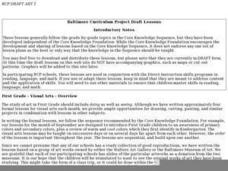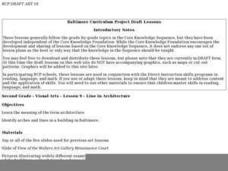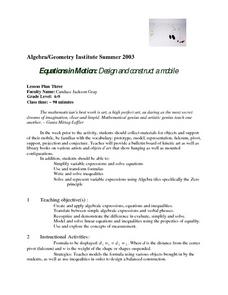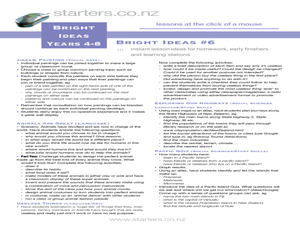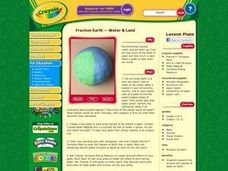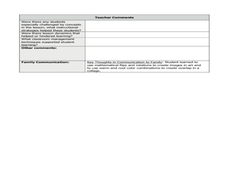Alabama Learning Exchange
Origami Geometry
Origami is an excellent way to combine Japanese culture, art, and geometric shapes into one engaging instructional activity! Scholars begin by listening to the story Sadako and the Thousand Paper Cranes and learn the origin of the...
Curated OER
Career Connections: The Connection Corner
Students will create a career information center. In this careers lesson, students research careers on a local and national level and create a help wanted ad for an occupation of personal interest. Students create a brochure and...
Curated OER
If You Give A Pig A Party
Students read If You Give A Pig A Party and participate in visual arts activities based on the book. In this visual arts lesson plan, students read the given book and do visual arts activities that include matching words to pictures,...
Curated OER
Shapes Show It
Students use art to express emotion. In this visual arts lesson, students explore the use of various colors and shapes in an effort to express emotions displayed in the Twelve Labors of Hercules. Students use the computer program...
Curated OER
Visual Art: Primary Colors
First graders identify primary colors and consider their use in works by Henri Mattise and Mary Cassatt. They conduct an experiment with food coloring and then draw a color tree differentiating between warm and cool colors.
Curated OER
Visual Arts - Lesson 9 - Line in Architecture
Second graders study the meaning of the term architecture and identify arches and lines in a building in Balimore.
Curated OER
Visual Arts
Students recognize warm and cool colors in a different medium. They look carefully at slide of medieval stained glass.
Curated OER
Colored Sand Art
Learners try different mediums to create works of art. Have students then decide what colors to put onto the glue. The colored sand can be sprinkles on by hand of shaken on by using salt or pepper shakers.
Curated OER
Life Skill Communication
Students use digital camera to document the needs for daily living. In this life skills and visual arts lesson, students create class books that include photographs of everyday objects that they use in their home, school and personal...
Curated OER
Equations in Motion: Design and construct a mobile
Students participate in a lesson that covers the concepts of solving equations and inequalities. To master the concept they must demonstrate visually and verbally how both sides of an equation must be balanced. They construct a balanced...
Curated OER
Angling Your Way Through a Picture
Students look at the geometry in an artwork. In this art history/geometry lesson, students research the artist Charles Sheeler and look at his painting Stacks in Celebration. They find the different types of lines, angles, and planes and...
Curated OER
Let's Make Play Dough
Students create their own play dough to use for art projects. In this art lesson, students measure, pour and mix the ingredients to make their own play dough. Then, students use the clay to create their own sculptures.
Curated OER
Drawing with Wire
Young scholars identify visual arts by examining visual models. In this art analysis lesson, students discuss the history of Keith Haring by researching information on the Internet. Young scholars view images showing Keith Haring's work...
Curated OER
Connect the Dots
In this visual arts learning exercise, students practice connecting the dots from one to sixty-three. Students then fill in the blanks with the letters of the character they just connected the dots to.
Curated OER
Bright Ideas #6
Students complete activities as extra time, learning stations, or homework activities. In this extra time lesson, students may complete the activities for visual arts, language skills, and social sciences. Students participate in jigsaw...
Curated OER
Graph Paper Patterns
Young artists divide a piece of graph paper into sections using rectangles, squares, and triangles. They then fill each section with patterns of shape and color. Elementary graders describe how their patterns are organized. Secondary...
Curated OER
Crayon Resist
Kids usually love crayon resist projects. It is so fascinating for them to see how the dark paint accentuates and resists the waxy crayon. Here are instructions for executing a crayon resist project of your own. Tip: Make the project fit...
Curated OER
Fraction Earth -- Water and Land
Students research the amount and sources of water on Earth. They interpret data to create a physical representation of water and land mass on the planet. They then use art materials to create a visual and tactile representation of...
Curated OER
Planets Beyond
Students recognize basic geometric shapes. They research the positions of planets in our solar system and find information on early theories about the location of planets and the sun. Students visualize planets as they might appear in an...
Curated OER
Classifying Pictures 2
Classification is the skill taught in this basic math worksheet. Kindergarteners examine four pictures in a row. They circle the picture that does not belong in the row with the other three pictures.
Curated OER
Wavelengths of Light
Explore physical science by participating in a visual spectrum experiments. Budding scientists identify the colors in the color spectrum and view the colors in class by utilizing cellophane, flash lights, and other arts and crafts...
Curated OER
Geometric Collages
Fourth graders investigate the concept of geometric patterning. They create their own patterns with a few basic requirements. The patterns must illustrate the concepts of flipping, 90 and 180 degree rotations. The collages also consist...
K12 Reader
Points on a Coordinate Grid
Introduce your class to the basics of coordinate planes. The reading passage included here describes ordered pairs and the different quadrants on a coordinate grid. Learners read the passage and respond to five related questions.
Annenberg Foundation
Geometry 3D Shapes: Surface Area and Volume
Whether you wrap it or fill it, you're using geometric concepts. Classmates use an interactive approach to learn how to find volume and surface area of cylinders and prisms in the second lesson in a five-part series. The online lesson...






